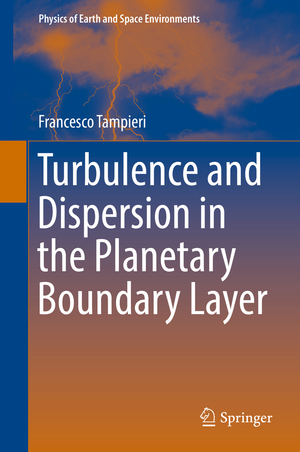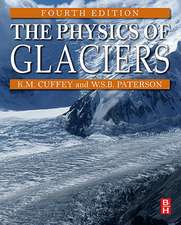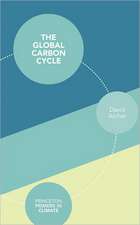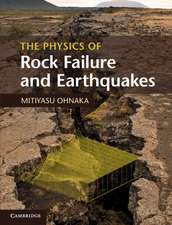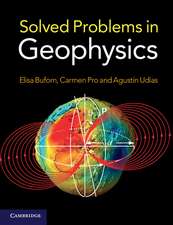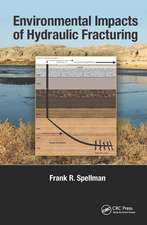Turbulence and Dispersion in the Planetary Boundary Layer: Physics of Earth and Space Environments
Autor Francesco Tampierien Limba Engleză Hardback – 10 oct 2016
This book offers a comprehensive review of our current understanding of the planetary boundary layer, particularly the turbulent exchanges of momentum, heat and passive scalars between the surface of the Earth and the atmosphere.
It presents and discusses the observations and the theory of the turbulent boundary layer, both for homogeneous and more realistic heterogeneous surface conditions, as well as the dispersion of tracers. Lastly it addresses the main problems arising due to turbulence in weather, climate and atmospheric composition numerical models.
Written for postgraduate and advanced undergraduate-level students and atmospheric researchers, it is also of interest to anyone wanting to understand the findings and obtain an update on problems that have yet to be solved.
| Toate formatele și edițiile | Preț | Express |
|---|---|---|
| Paperback (1) | 629.20 lei 38-44 zile | |
| Springer International Publishing – 14 iun 2018 | 629.20 lei 38-44 zile | |
| Hardback (1) | 733.96 lei 3-5 săpt. | |
| Springer International Publishing – 10 oct 2016 | 733.96 lei 3-5 săpt. |
Preț: 733.96 lei
Preț vechi: 895.07 lei
-18% Nou
Puncte Express: 1101
Preț estimativ în valută:
140.48€ • 144.77$ • 118.60£
140.48€ • 144.77$ • 118.60£
Carte disponibilă
Livrare economică 10-24 februarie
Preluare comenzi: 021 569.72.76
Specificații
ISBN-13: 9783319436029
ISBN-10: 3319436023
Pagini: 256
Ilustrații: XVI, 241 p. 72 illus., 62 illus. in color.
Dimensiuni: 155 x 235 x 19 mm
Greutate: 0.63 kg
Ediția:1st ed. 2017
Editura: Springer International Publishing
Colecția Springer
Seria Physics of Earth and Space Environments
Locul publicării:Cham, Switzerland
ISBN-10: 3319436023
Pagini: 256
Ilustrații: XVI, 241 p. 72 illus., 62 illus. in color.
Dimensiuni: 155 x 235 x 19 mm
Greutate: 0.63 kg
Ediția:1st ed. 2017
Editura: Springer International Publishing
Colecția Springer
Seria Physics of Earth and Space Environments
Locul publicării:Cham, Switzerland
Cuprins
Introduction.- The basic definition of the planetary boundary layer.- A few words about turbulence.- The structure and evolution of the PBL.- The transport problem and the turbulent dispersion.- Observations.- Numerical experiments and simulations.- Appendix.- References.- A summary of mathematics and physics for PBL.- Eulerian and Lagrangian description.- The equations for velocity and passive scalars.- Stochastic variables.- Reynolds averaged equations.- Universal features of shear-dominated turbulence.- Exercises.- References.- The basic paradigm: horizontal homogeneity over flat terrain.- The governing equations.- Inner and outer scaling from the wind profile.- Similarity, Obukhov length and beyond.- The surface layer in neutral and unstable conditions.- The outer region in neutral conditions.- Some features of the convective boundary layer.- Stable boundary layers.- Some remarks about the spectra.- Exercises.- References.- Horizontal heterogeneities.- Explicit treatment vs. parameterization.- Internal boundary layers.- The boundary layer over hills and valleys.- Subgrid effects of the heterogeneous surface features.- Low wind, small vertical fluxes.- Canopy flow and the urban PBL.- Exercises.- References.- Turbulent dispersion.- The transport problem for fluid parcels.- Absolute dispersion of tracer parcels.- Two-parcel dispersion.- Meandering.- Observations of dispersion.- The stochastic approach to the absolute dispersion of tracer parcels.- Dispersion of inertial particles.- Exercises.- References.- Numerical modeling of turbulence for PBL flows.- Introduction.- Closures for the Reynolds-averaged equations.- Large Eddy Simulations.- Numerical simulations of PBL problems.- Exercises.- References.- Solutions.- References.- Index.
Notă biografică
Francesco Tampieri is director of research of CNR in Italy. His main research interest is in environmental science, with special attention to fluid dynamics and atmospheric physics. In particular his activity concerns theoretical, modelling and experimental studies on the atmospheric boundary layer, on turbulence and on transport and dispersion. He published more than 60 papers on international referred journals and is member of the Editorial Board of the ERCOFTAC Bulletin and of Boundary Layer Meteorology. During his career he was visiting researcher at the Dept. of Applied Mathematics and Theoretical Physics, Cambridge (UK) and at the ECMWF (European Centre for Medium Range Weather Forecasts), Reading (UK). He has also been director of the Istituto per lo studio delle Metodologie Geofisiche Ambientali of CNR and of the Istituto di Scienze dell'Atmosfera e dell'Oceano of CNR. He gave courses and lectures in Italian Universities and in International Schools, in particular since 2001 hegives a course on "Planetary boundary layer and dispersion processes' at the Science Faculty, Bologna University.
Textul de pe ultima copertă
This book offers a comprehensive review of our current understanding of the planetary boundary layer, particularly the turbulent exchanges of momentum, heat and passive scalars between the surface of the Earth and the atmosphere.
It presents and discusses the observations and the theory of the turbulent boundary layer, both for homogeneous and more realistic heterogeneous surface conditions, as well as the dispersion of tracers. Lastly it addresses the main problems arising due to turbulence in weather, climate and atmospheric composition numerical models.
Written for postgraduate and advanced undergraduate-level students and atmospheric researchers, it is also of interest to anyone wanting to understand the findings and obtain an update on problems that have yet to be solved.
Caracteristici
Combines boundary-layer meteorology with a solid treatment of dispersion Can also be used as a textbook with a chapter entirely dedicated to excercises Conceptual aspects of different observational techniques are given in order to allow the reader to understand their advantages and limitations Provides the physical meaning of numerical models highlighting advantages and shortcomings with respect to other choices
